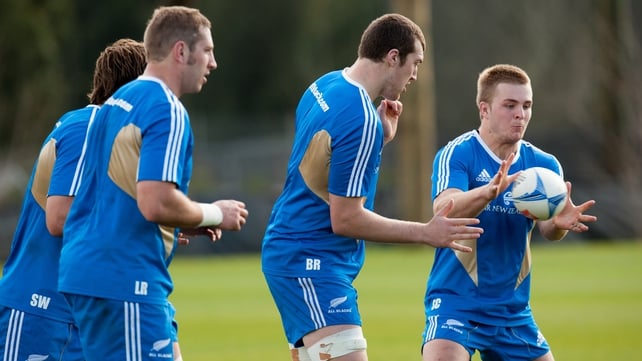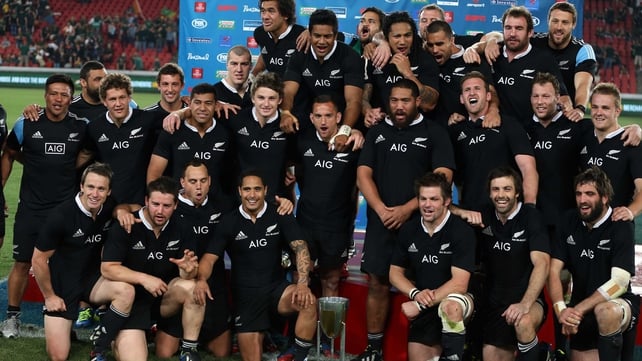Updated: Thursday, 21 Nov 2013 14:58 | Comments
Live
Video
Audio
By Bernard Jackman
Rugby was invented by the English but it has almost been perfected by New Zealand.
The All Blacks have a win record of 77% since the start of Test rugby and 86% since 2004. The current group has lost just once in 34 matches since winning the World Cup in 2011 and has a perfect record in 2013.
They are arguably the most dominant team in world sport.
But even though these All Blacks have compiled an incredible record over the last few years, I am not convinced that they are worthy of the "best team ever" mantle.
Their record is in part down to the quality of the opposition at the moment. South Africa, their nearest rivals, are on an upward curve but their game is very power-orientated while Australia and Argentina are in transition. On this tour, England and France have both caused major problems for New Zealand.
But New Zealand are special and they do have some big advantages that drive their success.
"The All Blacks have a win record of 77% since the start of Test rugby"
It starts with the skill levels of their players and their ability to replace top players who go to Europe or Japan to cash in with top quality replacements year on year.
That skill level is no accident. They start playing rugby at a young age in NZ, often in bare feet, and they concentrate on four key skills: catch, pass, run and evade.
Kids only start playing 15-a-side games from the age of 11 and even then, they are encouraged to keep the ball in hand with penalties resulting in a turnover of possession rather than an opportunity for three points.
That means New Zealand have the most complete footballers from 1 to 15. As a result, they can always stress the opposition in attack, unlike most teams who need certain players to be available at first and second receiver.
Look at the skill level of Ulster's John Afoa as an example and compare him to the majority of tight heads you watch play.
There is no comparison.
At a strategic level, New Zealand rugby understands clearly that the end product is the national side. There is a real cohesion from the top down.
Their High Performance Program is second to none and you rarely hear of disputes between the national squad and the club sides like we are used to in Europe.
At a practical level, every team follows the philosophy of New Zealand scrum coach Mike Cron.
They also have an unbelievable culture to support the talent. They select on character, not talent and believe "better people make better All Blacks".

The seeds of that were sown in 2003 when, after a disappointing year, Graham Henry completely overhauled the standards of the group.
Steve Hansen has modified some areas, but the core values have not changed much since then.
They aim to stay humble. A small but significant example is that they never leave a training facility or stadium dressing room without cleaning it leaving it ready for the next team.
It is the biggest names in rugby who implement this.
Staying humble means they rarely become complacent and are in touch with the effect their performances have on the New Zealand public.
They are something of an anomaly in that statistically, they are far from flawless.
Defensively, they have missed an average of over 20 tackles per game. On this tour, that number is actually 30 against England and 28 against France. That is an inordinately high number.
Against France two weeks ago, they also failed to convert forays into the opposition's 22 into points as often as they would like.
Going back to the Rugby Championship, they were ranked third of four in ball carries, metres made, offloads, and scrums and lineouts won on own throw.
On the positive side of the ledger, they scored the most tries (four per match on average) and had the most defenders beaten (21.8 per match).
They certainly benefit from being innovators. Other teams copy their tactics and techniques but they usually stay a step ahead.
For example, they kick from the hand a lot, averaging 29 per match. In part, that is because opposition teams have stopped kicking to them as it was such an effective source of unstructured ball for them to attack from.
But they have recognised that and evolved into a team that kicks with a view to winning the ball back. They are organised, accurate and contest the ball brilliantly and from any turnover ball they are lethal.
Their approach to strength and conditioning is another excellent illustration of how they think. I attended a presentation given by their Head of Strength and Conditioning in Paris two weeks ago.
For me, the biggest difference in what they do compared to what I have seen in other professional rugby environments around the world is that they bring everything back to what will make them better rugby players or a better rugby team.

They used to train slow in 2008 and as a result, they played slow. Now they train at the exact same speed they wish to play at, using technology like GPS to control what they are doing.
How does that manifest itself? Two years ago, New Zealand scrum-halves were running an average 7.5km per match. Now, they run just over 10km. As a result, their training program is designed to prepare them to run 10km at the same speeds they will need in a game.
They look at what they expect from each position from loose-head prop to full-back and design their strength and conditioning around that.
They do not try to create the best athletes, they try to create the best rugby players, fit enough to fulfil their potential on the rugby pitch and no more.
In Ireland, we sometimes miss the link between the athlete and the rugby player. What is the relevance of the ability to bench press or power clean to Test match rugby? Does it transfer simply from one sphere to the other?
And speaking of Ireland, on paper, New Zealand are probably the last team you would want to play when your are out of form. But despite the poor performance last week against Australia, I think New Zealand will actually be a good opponent for Ireland.
This match can help Ireland to get back on track and give Ireland a real barometer of where we are before the Six Nations in the Spring.
I am, obviously, a huge fan of this New Zealand group. But I believe we will test them in certain areas this weekend.
Read Bernard Jackman on where Ireland can target New Zealand tomorrow on RTÉ.ie/sport.
Live television coverage of Ireland v New Zealand from 13:00 on Sunday 24 November on RTÉ Two and RTÉ.ie (Ireland only). Live radio coverage on Sunday Sport from 14:00 on RTÉ Radio 1 and RTÉ.ie (Worldwide).
Anda sedang membaca artikel tentang
Analysis: Jackman on New Zealand
Dengan url
http://olahragaenjoy.blogspot.com/2013/11/analysis-jackman-on-new-zealand.html
Anda boleh menyebar luaskannya atau mengcopy paste-nya
Analysis: Jackman on New Zealand
namun jangan lupa untuk meletakkan link
Analysis: Jackman on New Zealand
sebagai sumbernya
0 komentar:
Posting Komentar